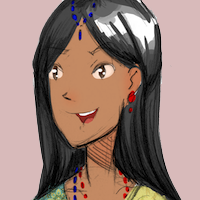TIFRAC
| This article is a work in progress. …well, all the articles here are, in a way. But this one moreso, and the article may contain incomplete information and editors’ notes. |
Technical Details
TIFRAC was the first digital computer developed in India, and one of the computers credited with starting India's computer revolution. It was in use from the mid-1950s to 1965, and was an early user of ferrite core memory. Its design was influenced by von Neumann's design principles, making it an IAS-type system. Specifically, the TIFRAC was influenced by fragments of knowledge about the ORDVAC system.
Character details
General
TIFRAC-tan is depicted as a dark-complexioned woman with long black hair and dark eyes. She generally wears traditional Indian clothing and has formal wear bedecked with elaborate beading and embroidery, referencing the stringing together of tens of thousands of small components.
TIFRAC-tan was a scientist, her fields of expertise were nuclear physics and computer science. She was highly sociable and affable, and tried to instill self-confidence and -reliance in her coworkers. Since she was built and operated by a team who had no prior experience with computers, TIFRAC-tan was no stranger to trial-and-error learning; while she was very ambitious and great at clever solutions, she was also somewhat injury-prone and frail, referencing the several thousand parts, and their many more connections that could break.
She had a long career for an early mainframe, but died when the TIFRAC mainframe was scrapped in the mid-1970's.
History and background
See also:
- Wikipedia article (see the reference listed)
